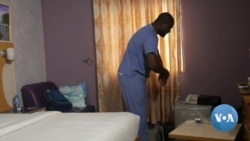Nigerian doctors began a nationwide strike Monday over unpaid COVID-19 hazard allowances and inadequate protective equipment during the pandemic. Other health workers' groups and associations are threatening to join the strike. Since the country’s first case, more than 1,000 Nigerian healthcare workers have become infected with COVID-19.
Disinfecting his bags in his hotel room, frontline nurse, Emasalome Julius has not seen his wife and months old baby since May when he left home to join a team of health workers responding to the coronavirus at an isolation center in Abuja.
He says he did not let his family know about the nature of the job because of the fear and stigma attached to the virus.
But weeks after daily contact with covid-19 patients at the isolation center, he contracted the virus. He was treated at the center for 11 days before testing negative for COVID-19.
"My case was very critical in the sense that I presented with almost all the symptoms except that I didn't lose my sense of smell. I had fever, cough, difficulty in breathing, diarrhea," said Julius, a frontline health worker. "I had loss of appetite; I could not eat for close to two weeks. By the time I was discharged, and I checked my weight, I had shed over 15 kilograms."
He continued working and received one month’s wages, but he still debated whether he should continue the job.
Then two weeks ago, Julius and some of his colleagues say they did not get their wages. After demanding payment, Julius says they were dismissed from their jobs.
Feeling dejected, Julius has been in quarantine without pay in this hotel room as he waits until it’s safe to reunite with his family.
"For us we feel we were used, infected and abandoned," said Julius.
For weeks healthcare employees have been demanding hazard pay and adequate protective equipment for workers on the COVID-19 frontlines. Some 1,000 Nigerian health workers have contracted the virus since the first case in February.
Last month, medics marched the streets of Abuja protesting unpaid allowances and undue exposure of members to the coronavirus.
Administrative officer to the Abuja government, Christian Ohaa, responded to the protesters.
"We're fighting this war with you and we have not denied you of all your allowances and benefits," said Ohaa. "Among the 36 states and Abuja, we'll be paying you regularly based on our own agreed allowances.”
But the National Association of Resident Doctors (NARD) says the government has been insensitive to health workers’ issues.
Selekeowei Kpuduwei is a regional head of the association.
"I think that the government has been unserious and resident doctors have been patient enough and we've given them enough time to come up with a solution." said Kpuduwei.
Strikes by medics are common in the West African nation where healthcare system has been underfunded for years.
But experts are concerned that the strike at this time could affect Nigeria's ability to respond effectively to the coronavirus pandemic.






